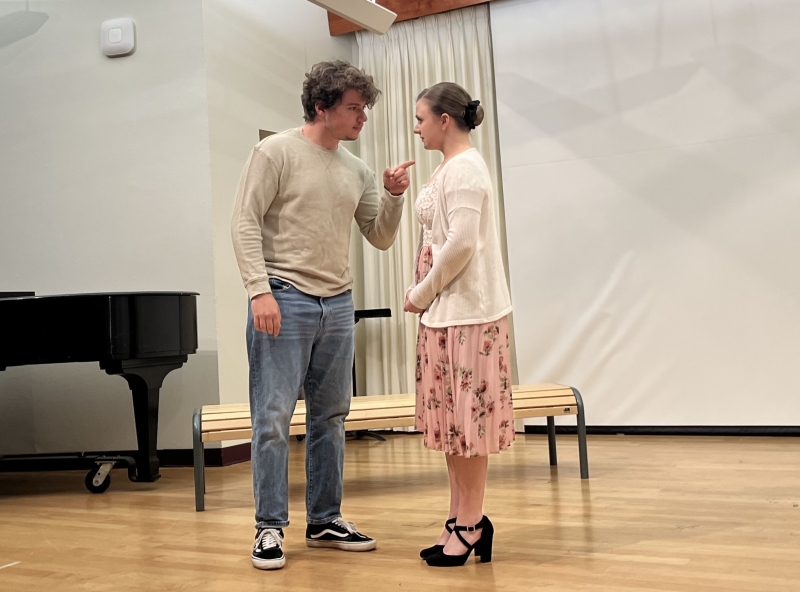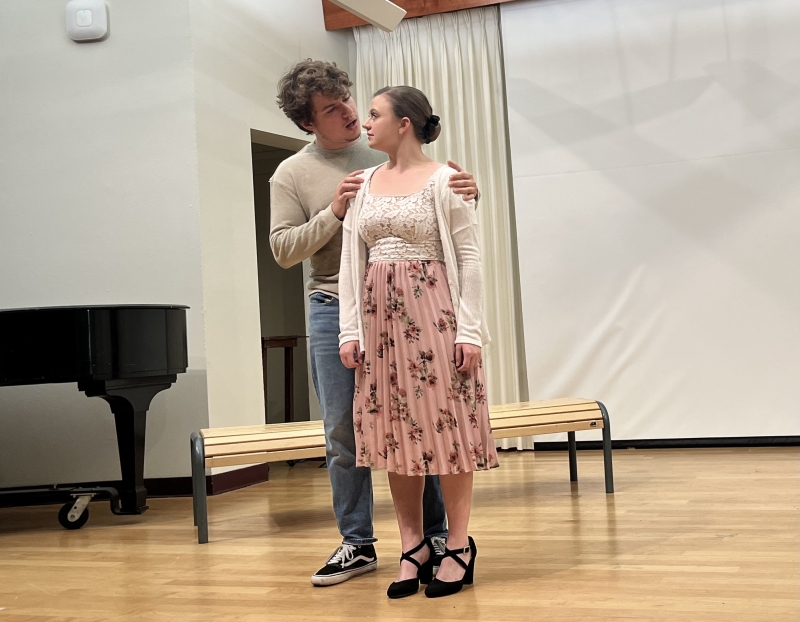Student Blog: On the Bench
Should Golden Age musicals take the bench or be on the field?
Decorated by the falling of acacia blossoms and the dull music of a merry-go-round, a small bench becomes a home base and a point of tension for the budding lovers in Rodger and Hammerstein's Carousel. "If I Loved You" is an extremely well-known song that underscores the discourse between a young woman and a brash man. On its surface, it's a beautiful melody that showcases beautiful singers. In its depth, it is a complex scene that propels the musical into the meat of the story and reveals everything there is to know about the relationship's dynamic. I am an adoring fan of the musical, having studied the scene academically and artistically, but my appreciation for the scene, its musical, and others like it, comes with stipulations.

explored every beat we could in the scene to
deepen our understanding and put reasoning
behind every choice. (PC: Amanda Townes)
In some instances, an actor might see the lady, Julie, as a girl so desperate for affection that she bends over backwards just because she's in love. I'd guess that she was written to be a bit more dynamic: submitting to her love, but acknowledging the pitfalls of her relationship. I interpreted Julie as a young woman confined to society's ideas of what is proper and respectable but interested in breaking the solidifying mold around her. Billy poses a form of risk, which is intriguing and inspiring. Undeniably it seems ridiculous that a sophisticated girl, who is still worried about maintaining her character, would simply quit her job and relinquish her rights to a bed each night. There has to be a motivation for her rash decision, and attributing it to the daze of love sickness is inactive and presumptuous. I came to the conclusion that Julie saw this moment as an opportunity. Denying her walk home to stay with a man who has a troubled past was an opportunity to oppose what is expected of her, gain some autonomy, and satisfy her sensuality. While she might not have gone looking for it, I think Julie realized she was being presented a ladder to climb and come of age upon, so she climbed. The moment she decides to stay on the bench is the moment she empowers herself.

to successfully build to the kiss. We
tried different options to appropriately
convey our intended message.
But, is this interpretation colored by my own lens? Have I completely misconstrued her character because I myself am an autonomous, empowered young woman? I am the product of my culture and cannot help but see every female identifying character as if they are on their own journey for independence. My thoughts beg a conversation regarding the depiction of women in theatre, specifically Golden Age women, and how we should be presenting them now. Carousel has its problematic qualities, as do many, with its misogyny and domestic violence. However, it does demonstrate a life led by many women, no matter their place in time, and sheds light on some of the learned behaviors of those women. I think it is important to present that kind of relationship, so that audiences can consider it and learn better, which I'd like to hope was a significant response to the show's original production. Yet, can a male duo depict the perspective of an abused wife accurately, or is that grounds to believe Julie isn't even an adequate demonstration?
I think it is largely the responsibility of people studying and producing Golden Age works to evaluate the way these sensitive issues are presented and to restructure them in a way that serves audiences. I firmly believe that these pieces should still be enjoyed and learned from, so long as it is done appropriately. Appropriate casting, proper collaborators, and detailed discussions regarding the directorial approach are necessary. Recent revivals of R&H musicals have been moving towards more effective demonstrations, as they take shows that were already once revolutionary and make as loud of a splash in the contemporary conversation. Telling Oklahoma through the female perspective and highlighting mental illness, and allowing Julie to acknowledge the constraints for women despite efforts to change the cycle are just the beginning of these modernizations. If our growing sensitivity to problems in society is influencing the way we see theatre, then we should, as a community, lean into that. Cancel culture shouldn't overwhelm the rich history of the musical theatre canon. Though it's more challenging than producing the shows in their original form, artistically reframing the musicals to incite conversation can amend issues society is now equipped to tackle. I believe there is much to learn from Golden Age musicals, and a plethora of music that would be missed, but only if we criticize, acknowledge, and shape their future presentations.

have failed to seem human. Reflecting humanity
within the scene became my most important goal.

Videos


